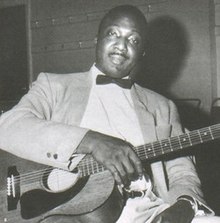J. B. Lenoir
| J. B. Lenoir | |
|---|---|
 |
|
| Background information | |
| Birth name | J. B. Lenoir |
| Born |
March 5, 1929 Monticello, Mississippi, United States |
| Died | April 29, 1967 (aged 38) Urbana, Illinois, United States |
| Genres | Chicago blues, blues |
| Occupation(s) | Musician, singer-songwriter |
| Instruments | Guitar, harmonica, vocals |
| Years active | 1950s–1967 |
| Labels | Parrot, Chess, Checker, J.O.B., USA Records,Vee-Jay |
| Associated acts | Big Bill Broonzy, Memphis Minnie, Big Maceo Merriweather, Muddy Waters, Sonny Boy Williamson II, Elmore James, Sunnyland Slim, J. T. Brown |
J. B. Lenoir /ləˈnɔːr/ (March 5, 1929 – April 29, 1967) was an American blues guitarist and singer-songwriter, active in the Chicago blues scene in the 1950s and 1960s.
His surname, which is french, is sometimes pronounced as the French "L'n WAHR", but he pronounced it "La NOR". His given name simply was J. B.; the letters are not initials.
He was born in Monticello, Mississippi. Lenoir's guitar-playing father introduced him to the music of Blind Lemon Jefferson, which became a major influence. During the early 1940s, Lenoir worked with the blues artists Sonny Boy Williamson II and Elmore James in New Orleans. He was later influenced by Arthur Crudup and Lightnin' Hopkins.
In 1949, he moved to Chicago, where Big Bill Broonzy helped introduce him to the blues community. He began to perform at local nightclubs, with musicians such as Memphis Minnie, Big Maceo Merriweather, and Muddy Waters, and became an important part of the city's blues scene. He began recording in 1951 for J.O.B. Records and Chess Records. His recording of "Korea Blues" was licensed to and released by Chess, as having been performed by J. B. and his Bayou Boys. His band included the pianist Sunnyland Slim, the guitarist Leroy Foster, and the drummer Alfred Wallace.
During the 1950s Lenoir recorded for various record labels in the Chicago area, including J.O.B., Chess, Parrot, and Checker. His more successful songs included "Let's Roll", "The Mojo" (featuring saxophonist J. T. Brown) and the controversial "Eisenhower Blues", which Parrot Records forced him to re-record as "Tax Paying Blues."
...
Wikipedia
